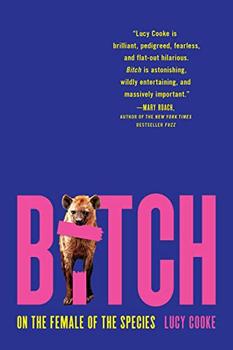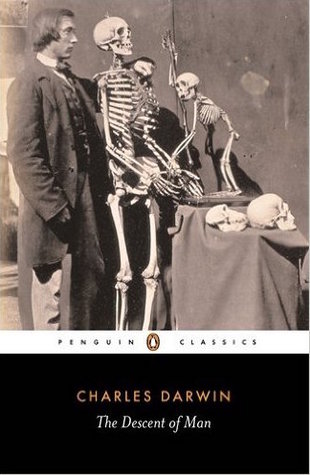Summary | Excerpt | Reviews | Beyond the Book | Read-Alikes | Genres & Themes | Author Bio

On the Female of the Species
by Lucy CookeThis article relates to Bitch
 In his seminal work, On the Origin of Species (1859), Charles Darwin elucidated the theory of evolution by natural selection, explaining how organisms better adapted to their environment are more likely to survive and pass on their genes. What he didn't explain, however, was human evolution — that was addressed in his second but much less famous book, The Descent of Man, and Selection in Relation to Sex (1871).
In his seminal work, On the Origin of Species (1859), Charles Darwin elucidated the theory of evolution by natural selection, explaining how organisms better adapted to their environment are more likely to survive and pass on their genes. What he didn't explain, however, was human evolution — that was addressed in his second but much less famous book, The Descent of Man, and Selection in Relation to Sex (1871).
The Descent of Man sought to answer a question that plagued his initial theory of natural selection: Why do traits like a peacock's tail or stag's horns exist when they have no obvious benefit and may even be a hindrance to avoiding predators? Darwin theorized that these characteristics helped in landing a mate — that they impacted "sexual selection" as he called it. Like his previous work, this theory was incredibly innovative, but because of its mix of observational science and Victorian social belief, The Descent of Man has managed to be both controversially progressive and conservatively restrictive in the century and a half since its publication.
Darwin's theory of sexual selection posits that features like colorful feathers, huge antlers and birdsong are "secondary sexual characteristics" that males developed to win over females for mating. Whether used for fighting off competitors or impressing potential mates, these appendages or adaptations demonstrate their fitness and serve to improve males' chances of passing on their genes.
But how do they win? Darwin put forth the concept of the female's choice in who she mates with as the deciding factor. Using birds again as an example, he stated, "[S]o it appears that female birds in a state of nature, have by a long selection of the more attractive males added to their beauty or other attractive qualities. No doubt this implies powers of discrimination and taste on the part of the female which will at first appear extremely improbable...I hope to be able to shew [sic] that the females actually have these powers."
It was female preference that influenced which characteristics were the most attractive and demonstrative of fitness, and therefore it was female choice that drove male evolution.
In Victorian England, where women were considered inferior to men, this idea was considered astonishing and absurd. But Darwin was no feminist in the modern sense, nor was he considered a champion of women in his own time. As Lucy Cooke shows in Bitch: On the Female of the Species, Darwin's timid foray into female empowerment was drowned out by his classification of males as "active" and females as "passive" in The Descent of Man.
According to Darwin, males have "stronger passions" than "coy" females. This dichotomy perfectly reflected Victorian social values of female submissiveness and domesticity, and it resounded so well with male scientists that this "sexist mythology has been baked into biology, and it distorts the way we perceive female animals," as Cooke explains. She shows how scientists following Darwin conducted experiments claiming to prove that females are naturally monogamous, using fruit flies and songbirds. When female scientists in the late 20th century began gathering evidence and using DNA, however, they found these stereotypes to be just that, and their work was ignored or ridiculed for years. "We even had one reviewer say that 'we were kind of dumb,'" one female ornithologist recalled to Cooke.
Primate research, including that conducted by female scientists, also reinforced sexist beliefs of male dominance. As Cooke shows, Dian Fossey, Jane Goodall and many male scientists focused their research on gorillas and chimpanzees, which have male-dominated hierarchies, and these species were assumed to be reflective of all primates, including humans. Yet scientists who studied female-dominant primates like lemurs in Madagascar and bonobos in the Congo basin weren't hailed as brilliant innovators, nor were their findings publicized as significant.
It wasn't until DNA evidence was commonplace and the number of women in scientific disciplines increased that Victorian ideas of female passivity and male virility were finally reexamined and, in the case of many animal species, overturned. These contradictions that stemmed from The Descent of Man render the book a historically valuable treatise for understanding how our worldview shapes our science. At once progressive for suggesting females exert control over selection and evolution, and still straightjacketed by its contemporary mores, this work reminds us that science must be a continual process — building on foundations but never tethered to the past.
The Descent of Man by Charles Darwin, courtesy of Goodreads
Filed under Medicine, Science and Tech
![]() This "beyond the book article" relates to Bitch. It originally ran in August 2022 and has been updated for the
October 2023 paperback edition.
Go to magazine.
This "beyond the book article" relates to Bitch. It originally ran in August 2022 and has been updated for the
October 2023 paperback edition.
Go to magazine.
Your guide toexceptional books
BookBrowse seeks out and recommends the best in contemporary fiction and nonfiction—books that not only engage and entertain but also deepen our understanding of ourselves and the world around us.